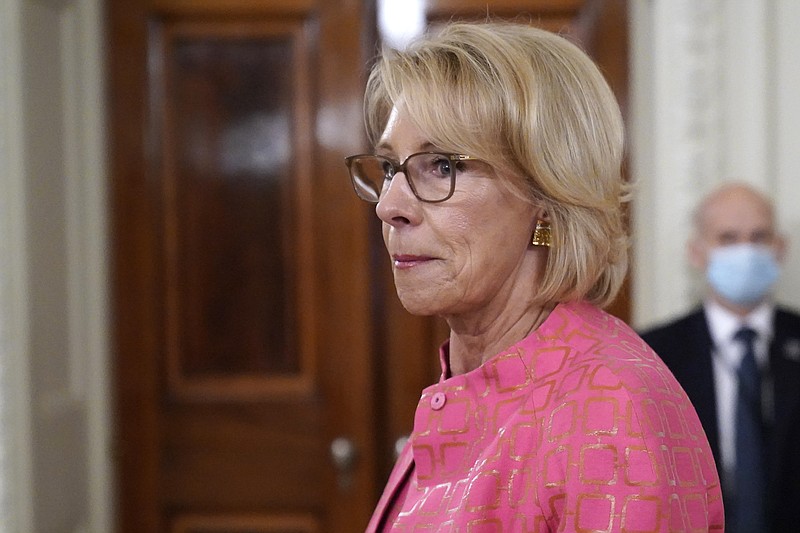As millions of American children start the school year online, the Trump administration is hoping to convert their parents’ frustration and anger into newfound support for school choice policies Education Secretary Betsy DeVos has long championed but struggled to advance nationally.
DeVos and President Donald Trump have repeatedly invoked school choice as the solution to parents’ woes. If public schools fail to open, they said, parents should get a cut of the district’s federal funding to send their children to private schools or for home schooling, learning pods or other options that have arisen during the coronavirus pandemic.
For Trump, it’s seen as a potential lifeline to Black and Hispanic voters, who are more likely to support vouchers and other school choice options, polls have found. Speaking at the White House in July, Trump declared “there is nothing that the African American community wants more than school choice.” He has also used the issue as a political weapon against Democratic opponent Joe Biden, who supports stricter accountability measures for charter schools.
For DeVos, however, the pandemic offers a new chance to win support for policies she has spent her career promoting. Before taking office, she spent decades as an advocate for charter schools and voucher programs in Michigan and elsewhere. As secretary, she has been credited with helping states expand programs but has struggled to make headway on federal legislation.
Since last year, she has been calling for a $5 billion federal tax credit to support scholarships that help students attend private schools or other education alternatives. The idea was included in Senate Republicans’ latest relief bill, which was voted down Thursday.
DeVos’ critics accuse her of exploiting a public health crisis to pursue her political agenda. However, she said she’s fighting to give families access to a wider array of options as many districts remain online.
“Parents are increasingly demanding it,” DeVos said in an interview. “It’s becoming ever more evident that parents and students need to have more choices. I would argue that it is the ideal time to be talking about this more widely. And in fact, we are.”
In nearly every public appearance she has made during the pandemic, DeVos has used the spotlight to draw attention to school choice. On Twitter, she has highlighted stories of families calling for options beyond their local public schools. And even as schools of all type suffer financially as a result of the pandemic, DeVos has emphasized the struggles of private, religious schools.
Her focus on school choice has drawn sharp opposition from Democrats and public school leaders. In July, DeVos issued a rule that sought to shift millions of dollars in federal virus relief from public schools to private schools. Democrats and some Republicans in Congress said the rule conflicted with the intent of the funding bill, and several states vowed to ignore it. This month a federal judge appointed by Trump struck down the rule, saying DeVos overstepped her powers.
DeVos also drew criticism for using $180 million in relief aid to create new “microgrants” that families could use to send students to private schools, among other purposes. At the same time, she has publicly assailed some public schools that decided to start the school year primarily or entirely online. In-person instruction should be available to any family that wants it, DeVos has said, and anything short of that fails students and taxpayers.
Rep. Bobby Scott, D-Va., chairman of the House Committee on Education and Labor, said DeVos has shown an “overwhelming” preference for private schools amid the pandemic, while doing little to help public schools reopen safely.
“She has at every opportunity used all of her discretion to divert money from the public schools, particularly low-income students in public schools, to help fund private schools,” Scott said.
Some public school districts have called on DeVos to provide clearer guidance and to push for more funding. Congress earmarked $13 billion for schools in a March relief package, but many districts said the money barely started to cover the costs of reopening.
“I don’t see anyone advocating for public education, I don’t see anyone providing additional funding, I don’t see reasonable guidance,” said Shari Camhi, superintendent of the Baldwin Union Free School District in New York. “Where is the coordinated effort to get all schools the required PPE? The required technology?”
DeVos, however, said she’s working closely with governors and state education chiefs and has yet to hear a complaint from them. She calls claims she hasn’t done enough “hand wringing” and “excuse making.”
“There’s a notion that we had to have some dictate from the federal level about what schools have to do,” DeVos said. “It’s just a fallacy. And I’m afraid in many cases, it is an excuse for inaction.”
Her response has frustrated some superintendents who said DeVos told schools to reopen but left them to figure out how. She won praise for granting schools flexibility with federal rules, but many school chiefs take issue with her public admonishments and her renewed calls for school choice.
“Choice is important, but so is safety,” said Kristi Wilson, president of AASA, a national superintendent’s association. “We appreciate the flexibility, but what we don’t want is more divisiveness and more rhetoric.”

